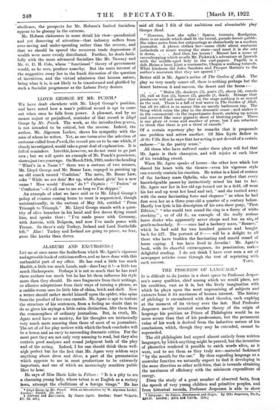ALARUMS AND EXCURSIONS.t
LET me at once name the faults from which Mr. Agate's vigorous and agreeablebook of criticism suffers, and so have done with this unthankful part of my office. He has read a little too much Hazlitt, a little too much Lamb, and—dare I say it ?—a little too much Shakespeare. Perhaps it is not so much that he has read these authors too much but he has let them influence his style more than they should. He uses fragments from their writings, or allusive adaptations from their ways of turning a phrase, as a caddis-worm uses its little bits of china, brick and shell. Now a writer should rather model himself upon the spider, who spins from the product of her own entrails. Mr. Agate is apt to torture the structure of his sentences, from a feeling no doubt that to do so gives his sayings a little extra distinction, lifts them from the commonplace of ordinary journalism. But, in truth, Mr. Agate need have no anxiety, for his thoughts are intrinsically very much more amusing than those of most of US journalists. The set of ad hoc play notices with which the book concludes will be a lesson and an envy to succeeding dramatic critics. For the most part they are not only very amusing to read, but they also contain good analyses and sound judgment both of the play and of the acting. Indeed, I for one should think them well- nigh perfect but for the fact that Mr. Agate very seldom says anything about dress and decor, a part of the presentation which appears to me in most productions to be extremely important, and one of which an increasingly sensitive public likes to hear.
He says of Miss Marie Lohr in Fedora : "It is a pity to see a charming young lady, whose talent is as English as a rectory lawn, attempt the ebullitions of a foreign virago." He has • Lloyd George by Mr. Punch. With an introduction by W. Algernon Locker. London: Cassell. 16s. net.] t Alannna and Zzczuvione. By James Agate. London : Grant Richards. 17s, Od. net.)
said all that I felt of that ambitious and abominable play Georges Sand.
"Heavens, how she talks ! Spates, torrents, floodgates, there is no simile which shall fit the trivial, pseudo-heroic gabble. She takes notes from her outpourings as shamelessly as a modern journalist. A phrase strikes her—some cliché about sunburnt cathedrals or music wooing the starsancl meet it is she "sets it down. . . . And then her lovers ! Musset has a scene of eavesdropping which recalls Mr. Pickwick's adventure at Ipswich with the middle-aged lady in the curl-papers. Pagello is a dolt, Heine a boor, Liszt a marionette, Chopin a walking tubercle. What kindness did Jules Sandeau and Prosper Merimee to tho author's ancestors that they are spared ? "
Better still is Mr. Agate's notice of The Garden of Allah. The play so very nearly conics off, there is nothing perhaps but tho desert between it and success, the desert and the fauna ; • • •
"Mules (2), donkeys (5), goats (7), sheep (4), camels (3), calf at foot (1), horses (2), gazelle (1, dead). Strango that producers will not realize that on the stage nothing is so unreal as the real. There is a fall of real water in The Garden of Allah, but all its effect is to annoy like an tinnily bathroom tap. The thing which ruins the play in the dramatic sense—and makes it in the commercial—is the importunate desert, sucking up action and interest like some gigantic sheet of blotting-paper. There is one glory of verse and another of prose, but I am reluctant to think that there is yet a third of camels."
Of a certain repertory play he remarks that it propounds one problem and solves another. Of Miss Kyrie Bellew in At the Villa Rose he says that her acting is not devoid of a certain sadness—" in the pastry sense."
All those who have suffered under these plays will feel that Mr. Agate is their champion, and will rejoice at each blow of his twinkling sword. • When Mr. Agate speaks of horses—the other love which has shared his heart with the theatre—even his vigorous style can scarcely contain his emotion. He writes in a kind of ecstasy of the hackney mare Ophelia, who was so perfect that every knowledgeable passer-by instinctively raised his hat to her. Mr. Agate saw her in her old age turned out in a field, off went his hat and up went her head and tail, "and she trotted away with the same fascinating force and elegance" as when he had first seen her as a three-year-old a quarter of a century before. Hardly less lyric is his description of his own show pony, "First Edition," "who would trot round the ring in a flurry of white stocking " ; or of old S., an example of the really serious horse dealer who apparently never sleeps and has an air, of gentle melancholy. S— once had a hackney mare, "Bounce," which he had sold for two hundred guineas and bought back for 127. The portrait of S— will be a delight to all those who have trodden the fascinating and razzed round of horse coping. I too have lived in Arcadia ! Mr. Agate's book, with its cheerful extravagance, its penetration, makes delightful reading. I do not think I have ever seen a set of newspaper articles come through the test of reprinting with


































 Previous page
Previous page